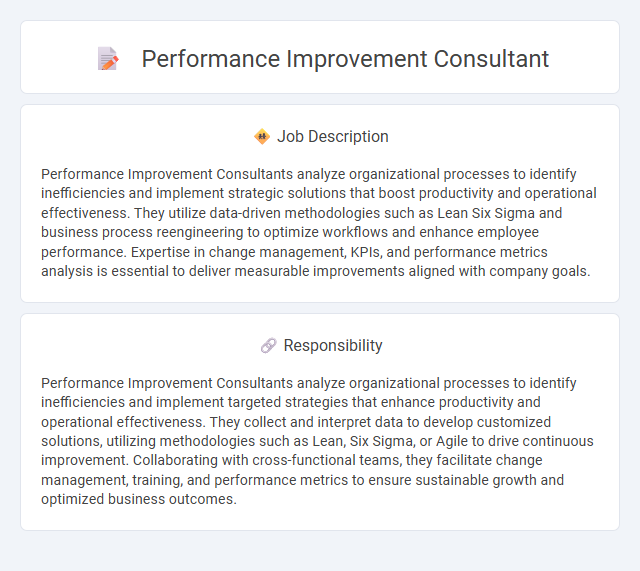
Performance Improvement Consultants analyze organizational processes to identify inefficiencies and implement strategic solutions that boost productivity and operational effectiveness. They utilize data-driven methodologies such as Lean Six Sigma and business process reengineering to optimize workflows and enhance employee performance. Expertise in change management, KPIs, and performance metrics analysis is essential to deliver measurable improvements aligned with company goals.
People who are analytical, detail-oriented, and thrive on solving complex problems are likely suitable for a Performance Improvement Consultant role. Those with strong communication skills and a passion for driving organizational change may find this job fulfilling. Individuals who struggle with ambiguity or resist adapting to new processes might face challenges in this position.
Qualification
Performance Improvement Consultants typically hold a bachelor's degree in business, management, or industrial engineering, with many possessing advanced certifications such as Six Sigma, Lean, or PMP. Proven experience in data analysis, process optimization, and change management is essential for identifying inefficiencies and implementing effective strategies. Strong communication and project management skills enable these professionals to collaborate with stakeholders and drive measurable improvements in organizational productivity.
Responsibility
Performance Improvement Consultants analyze organizational processes to identify inefficiencies and implement targeted strategies that enhance productivity and operational effectiveness. They collect and interpret data to develop customized solutions, utilizing methodologies such as Lean, Six Sigma, or Agile to drive continuous improvement. Collaborating with cross-functional teams, they facilitate change management, training, and performance metrics to ensure sustainable growth and optimized business outcomes.
Benefit
Performance Improvement Consultants likely enhance organizational efficiency by identifying gaps and implementing targeted strategies. Their expertise may lead to increased productivity, cost savings, and employee engagement. Companies probably experience measurable improvements in processes and outcomes through their interventions.
Challenge
Performance Improvement Consultant roles often involve identifying complex organizational inefficiencies that may hinder growth and productivity. Challenges likely arise from resistance to change within teams and a need to tailor solutions to diverse business environments. Success in this role probably depends on the consultant's ability to analyze data effectively and implement strategic improvements that align with company goals.
Career Advancement
Performance Improvement Consultants specialize in analyzing organizational processes to identify inefficiencies and implement strategic solutions that drive productivity and profitability. Advancing in this career often involves gaining expertise in data analytics, project management, and change management to lead larger, more complex initiatives. Earning certifications such as Six Sigma or PMP enhances prospects for leadership roles and higher-level consulting positions within corporate or consulting firms.
 kuljobs.com
kuljobs.com